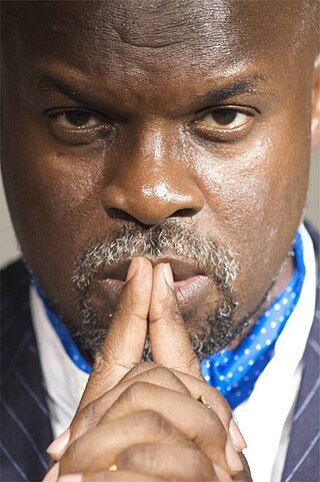Racism is discrimination and prejudice against people based on their race or ethnicity. Racism can be present in social actions, practices, or political systems that support the expression of prejudice or aversion in discriminatory practices. The ideology underlying racist practices often assumes that humans can be subdivided into distinct groups that are different in their social behavior and innate capacities and that can be ranked as inferior or superior. Racist ideology can become manifest in many aspects of social life. Associated social actions may include nativism, xenophobia, otherness, segregation, hierarchical ranking, supremacism, and related social phenomena.
Racial color blindness refers to the belief that a person's race or ethnicity should not influence their legal or social treatment in society.

Robert Ezra Park was an American urban sociologist who is considered to be one of the most influential figures in early U.S. sociology. Park was a pioneer in the field of sociology, changing it from a passive philosophical discipline to an active discipline rooted in the study of human behavior. He made significant contributions to the study of urban communities, race relations and the development of empirically grounded research methods, most notably participant observation in the field of criminology. From 1905 to 1914, Park worked with Booker T. Washington at the Tuskegee Institute. After Tuskegee, he taught at the University of Chicago from 1914 to 1933, where he played a leading role in the development of the Chicago School of sociology.

The American Sociological Association (ASA) is a non-profit organization dedicated to advancing the discipline and profession of sociology. Founded in December 1905 as the American Sociological Society at Johns Hopkins University by a group of fifty people, the first president of the association would be Lester Frank Ward. Today, most of its members work in academia, while around 20 percent of them work in government, business, or non-profit organizations.

Public sociology is a subfield of the wider sociological discipline that emphasizes expanding the disciplinary boundaries of sociology in order to engage with non-academic audiences. It is perhaps best understood as a style of sociology rather than a particular method, theory, or set of political values. Since the twenty-first century, the term has been widely associated with University of California, Berkeley sociologist Michael Burawoy, who delivered an impassioned call for a disciplinary embrace of public sociology in his 2004 American Sociological Association (ASA) presidential address. In his address, Burawoy contrasts public sociology with what he terms "professional sociology", a form of sociology that is concerned primarily with addressing other academic sociologists.

Critical race theory (CRT) is an interdisciplinary academic field devoted to analysing how social and political laws and media shape social conceptions of race and ethnicity. CRT also considers racism to be systemic in various laws and rules, and not only based on individuals' prejudices. The word critical in the name is an academic reference to critical thinking, critical theory, and scholarly criticism, rather than criticizing or blaming individuals.

Tukufu Zuberi is an American sociologist, filmmaker, social critic, educator, and writer. Zuberi has appeared in several documentaries on Africa and the African diaspora, including Liberia: America's Stepchild (2002), and 500 Years Later (2005). He is one of the hosts of the long-running PBS program History Detectives. As founder of his own production company, he produced the film African Independence, which premiered at the San Diego Black Film Festival in January 2013. He is the Lasry Family Professor of Race Relations, professor and chair of the sociology department, and professor of Africana studies at the University of Pennsylvania.
Reverse racism, sometimes referred to as reverse discrimination, is the concept that affirmative action and similar color-conscious programs for redressing racial inequality are forms of anti-white racism. The concept is often associated with conservative social movements and reflects a belief that social and economic gains by black people and other people of color cause disadvantages for white people.

France Winddance Twine is a Black and Native American sociologist, ethnographer, visual artist, and documentary filmmaker. Twine has conducted field research in Brazil, the UK, and the United States on race, racism, and anti-racism. She has published 11 books and more than 100 articles, review essays, and books on these topics.

Joe Richard Feagin is an American sociologist and social theorist who has conducted extensive research on racial and gender issues in the United States. He is currently the Ella C. McFadden Distinguished Professor at Texas A&M University. Feagin has previously taught at the University of Massachusetts, Boston, University of California, Riverside, University of Texas at Austin, and the University of Florida.
Laissez-faire racism is closely related to color blindness and covert racism, and is theorised to encompass an ideology that blames minorities for their poorer economic situations, viewing it as the result of cultural inferiority. The term is used largely by scholars of whiteness studies, who argue that laissez-faire racism has tangible consequences even though few would openly claim to be, or even believe they are, laissez-faire racists.

The sociology of race and ethnic relations is the study of social, political, and economic relations between races and ethnicities at all levels of society. This area encompasses the study of systemic racism, like residential segregation and other complex social processes between different racial and ethnic groups.
Race relations is a sociological concept that emerged in Chicago in connection with the work of sociologist Robert E. Park and the Chicago race riot of 1919. Race relations designates a paradigm or field in sociology and a legal concept in the United Kingdom. As a sociological field, race relations attempts to explain how racial groups relate to each other. These relations vary depending on historical, social, and cultural context. The term is used in a generic way to designate race related interactions, dynamics, and issues.

Racism without Racists: Color-Blind Racism and the Persistence of Racial Inequality in the United States is a book about color-blind racism in the United States by Eduardo Bonilla-Silva, a sociology professor at Duke University. It was originally published by Rowman & Littlefield in 2003, and has since been re-published four times, most recently in June 2017. The fourth edition was published soon after Barack Obama's election, and includes a new chapter on what Bonilla-Silva calls "the new racism". It was reviewed favorably in Science & Society, Urban Education, Educational Studies, and Multicultural Perspectives.
The W.E.B. Du Bois Career of Distinguished Scholarship Award is given annually by the American Sociological Association to a scholar among its members whose cumulative body of work constitutes a significant contribution to the advancement of sociology. Formerly called simply the Career of Distinguished Scholarship Award, the award was renamed in 2006 to honor pioneering American sociologist W. E. B. Du Bois.
Matthew Windust Hughey is an American sociologist known for his work on race and racism. He is Professor of Sociology at the University of Connecticut, where he is also an adjunct faculty member in the Africana Studies Institute; American Studies Program; Institute for Collaboration on Health, Intervention, & Policy; Sustainable Global Cities Initiative, and; graduate certificate program in Indigeneity, Race, Ethnicity, & Politics. His work has included studying whiteness, race and media, race and politics, racism and racial assumptions within genetic and genomic science, and racism and racial identity in white and black American fraternities and sororities.

Racism in a Racial Democracy: The Maintenance of White Supremacy in Brazil is a book by anthropologist France Winddance Twine published by Rutgers University Press in 1997.
Gilda Laura Ochoa is an American sociologist and professor. She is Professor of Chicana/o-Latina/o studies at Pomona College in the United States, and the author of Academic Profiling: Latinos, Asian Americans, and the Achievement Gap.
Adia Harvey Wingfield is a professor of sociology at Washington University in St. Louis and the 2018 President of Sociologists for Women in Society. She is the author of several books, including No More Invisible Man: Race and Gender in Men's Work, and articles in peer-reviewed journals including Social Problems, Gender & Society, and Ethnic and Racial Studies. She has lectured internationally on her research.
White habitus is a pattern of socialization among white people that excludes black people and their culture, created as a result of racial segregation.









